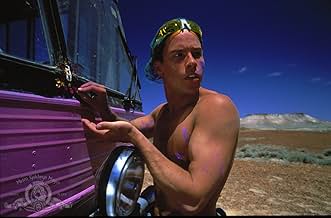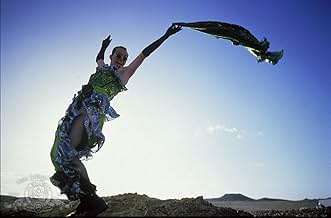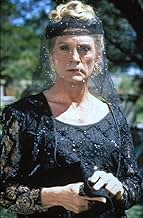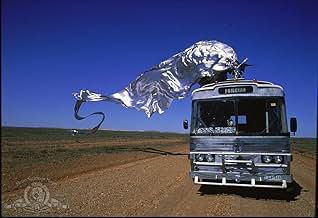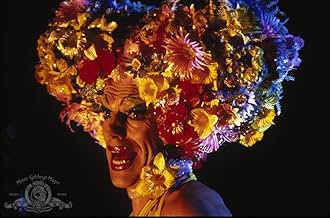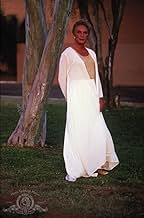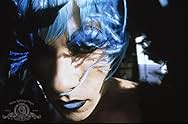Priscilla, folle du désert
Titre original : The Adventures of Priscilla, Queen of the Desert
- 1994
- Tous publics
- 1h 44min
Deux artistes dragueurs et une femme transgenre parcourent le désert pour interpréter leur style unique de cabaret.Deux artistes dragueurs et une femme transgenre parcourent le désert pour interpréter leur style unique de cabaret.Deux artistes dragueurs et une femme transgenre parcourent le désert pour interpréter leur style unique de cabaret.
- Récompensé par 1 Oscar
- 11 victoires et 19 nominations au total
Rebel Penfold-Russell
- Logowoman
- (as Rebel Russell)
Histoire
Le saviez-vous
- AnecdotesAs of 2024, this is still the most recent contemporary-set film (i.e. non-period, non-fantasy, non-sci-fi) to win the Academy Award for Best Costume Design.
- GaffesWhen they are in the bar in Broken Hill, Old Shirl comes over and slaps her right hand down on Bernadette's. Then, in the next camera shot, it's her left hand.
- Citations
Bernadette: [to Shirley] Now listen here, you mullet. Why don't you just light your tampon, and blow your box apart? Because it's the only bang you're ever gonna get, sweetheart!
- Crédits fousA scene after the credits finish shows an Asian garden where a blow up doll (released earlier in the movie in Australia) lands on a man, who looks quite puzzled.
- Versions alternativesThe film was "Shown in Dragarama" at select theatres at the time of release. This involved some theatres using a mirror-ball and colored lighting during the "Finally" dance number.
- ConnexionsEdited into Picnic at Wolf Creek (2006)
- Bandes originalesI've Never Been To Me
Written by Ken Hirsch and Ronald Miller
Performed by Charlene
Published by Stone Diamond Music Corp. / Jobete Music
Courtesy Motown Record Company LP
Commentaire à la une
A relatively low budget Australian film about drag queens took the world by storm, almost caused a riot at the Cannes film festival and drove a million young queens to the dressing up box in the hunt for sequins, sparkles and pink flip-flops! The Adventures of Priscilla, Queen of The Desert gave us such classic lines as, "Just what this country needs, another cock in a frock on a rock!" and "Listen here you mullet, why don't you just light your tampon and blow your box apart, it's the only bang you're ever going to get, sweetheart"
It is without exception the best and arguably the most successful drag queen movie of all time, breaking box office records and capturing the top of the charts in numerous countries around the world. It was an Academy award winning extravaganza of glitter, glam and lip-syncing with the most outrageously camp costumes the world had seen outside Madame JoJo's or Funny Girls! Uproariously funny and yet deeply affecting it proved to be way more than just a camp outing of tried and tested queer humour.
The late eighties was a bit of a coming of age time for Australia's gay population, especially Sydney, it really came alive and blossomed into one of the bigger gay populations in the world. Australia has a reputation for all the big butch manly men, which considering how the modern nation of Australia started, would seem pretty accurate, only it's not, it's completely different, ever so much more vibrant and colourful. It is that vibrancy, that colour and that hopefulness that is so perfectly depicted in Priscilla.
Stephen Elliott, the director and writer, who incidentally has a small cameo in the movie as a cute door boy in Alice, says he saw drag shows in other places, like the US and England, which were essentially men in dresses lip-syncing to other peoples songs. In Australia they did the same, but took it in a completely new direction, it became a completely new strange variety of theatre, so much so that he even used to go to drag queen jelly wrestling, pushing the envelope to the maximum. It was this experience along with watching a drunken drag queen at the Sydney gay Mardi Gras, which gave birth to the movie idea, which took hardly any time at all to write.
From the very opening you know this film has deep rooted soul, first shots of Hugo as Mitzi mouthing the words to the poignant Charlene song, 'I've been to paradise, but I've never been to me' give the impression of an emotively sad song, yet this is so rapidly defused by the appearance of a lethargic priest and Felicia nursing a baby rubber chicken. You have left in no doubt after that that is no ordinary Australian movie and the jokes and gags just tumble on from there in rapid succession. However it's not all giggles, there are some key moments of high emotion - seeing the graffiti sprayed on the side of the bus in pink paint the morning after shocks the trio along with the audience and strikes a chord with those of old enough to have lived through a time of such prejudice and discrimination and how true those word seem when they ring in our ears, that no matter how tough we think we are, such things still hurt.
There are deeply moving scenes, such as the gay bashing of Felicia and the confrontation between Mitzi and his son in Alice, which really seem seep through the comedy to dance in your heart and make you fall in love with the film.  One of the key aspects of the movie is the superb casting; Terrence Stamp previously typecast as your typical British villain, took a risk on the role of Bernadette and knocked it out of the water in a downbeat, down trodden put upon yet completely resilient way. Hugo Weaving is the less visually striking member of the trio and the central character of Mitzi, who really is the lynch pin between the two worlds. The role of Felecia is taken by the simply stunning Guy Pearce who had literally just left long running soap Neighbours, in which he played goodie two shoes Mike and was an inspired choice and oh so pretty. Guy's superb performance takes the movie to new heights and is so good that the he has had trouble-convincing people he is actually straight in real life, even to this day. Bill Hunter a massive Australian character actor shines outstandingly as the gruff and butch Bob, the mechanic and unlikely love interest for one of the three.
Priscilla is a beautiful magical combination of humour, catty bitchiness, kitsch costumes, stunning disco soundtrack and subtle sentiment with provocative thoughtful scenes and a delicate brush of honesty. Some jokes are obvious so too is the stereotypical veneer of the characters upon first glance, yet look a little deep as the film rolls on, you see more and more layers being unpeeled and exposed in a gently moving and comical way. It is one of the most enjoyable gay movies of all time; each subsequent viewing cements that sentiment further into fact. Read more and find out where this film made it in the Top 50 Most Influential Gay Movies of All Time book, search on Amazon for Top 50 Most Influential Gay Movies of All Time, or visit - http://www.amazon.co.uk/dp/B007FU7HPO
It is without exception the best and arguably the most successful drag queen movie of all time, breaking box office records and capturing the top of the charts in numerous countries around the world. It was an Academy award winning extravaganza of glitter, glam and lip-syncing with the most outrageously camp costumes the world had seen outside Madame JoJo's or Funny Girls! Uproariously funny and yet deeply affecting it proved to be way more than just a camp outing of tried and tested queer humour.
The late eighties was a bit of a coming of age time for Australia's gay population, especially Sydney, it really came alive and blossomed into one of the bigger gay populations in the world. Australia has a reputation for all the big butch manly men, which considering how the modern nation of Australia started, would seem pretty accurate, only it's not, it's completely different, ever so much more vibrant and colourful. It is that vibrancy, that colour and that hopefulness that is so perfectly depicted in Priscilla.
Stephen Elliott, the director and writer, who incidentally has a small cameo in the movie as a cute door boy in Alice, says he saw drag shows in other places, like the US and England, which were essentially men in dresses lip-syncing to other peoples songs. In Australia they did the same, but took it in a completely new direction, it became a completely new strange variety of theatre, so much so that he even used to go to drag queen jelly wrestling, pushing the envelope to the maximum. It was this experience along with watching a drunken drag queen at the Sydney gay Mardi Gras, which gave birth to the movie idea, which took hardly any time at all to write.
From the very opening you know this film has deep rooted soul, first shots of Hugo as Mitzi mouthing the words to the poignant Charlene song, 'I've been to paradise, but I've never been to me' give the impression of an emotively sad song, yet this is so rapidly defused by the appearance of a lethargic priest and Felicia nursing a baby rubber chicken. You have left in no doubt after that that is no ordinary Australian movie and the jokes and gags just tumble on from there in rapid succession. However it's not all giggles, there are some key moments of high emotion - seeing the graffiti sprayed on the side of the bus in pink paint the morning after shocks the trio along with the audience and strikes a chord with those of old enough to have lived through a time of such prejudice and discrimination and how true those word seem when they ring in our ears, that no matter how tough we think we are, such things still hurt.
There are deeply moving scenes, such as the gay bashing of Felicia and the confrontation between Mitzi and his son in Alice, which really seem seep through the comedy to dance in your heart and make you fall in love with the film.  One of the key aspects of the movie is the superb casting; Terrence Stamp previously typecast as your typical British villain, took a risk on the role of Bernadette and knocked it out of the water in a downbeat, down trodden put upon yet completely resilient way. Hugo Weaving is the less visually striking member of the trio and the central character of Mitzi, who really is the lynch pin between the two worlds. The role of Felecia is taken by the simply stunning Guy Pearce who had literally just left long running soap Neighbours, in which he played goodie two shoes Mike and was an inspired choice and oh so pretty. Guy's superb performance takes the movie to new heights and is so good that the he has had trouble-convincing people he is actually straight in real life, even to this day. Bill Hunter a massive Australian character actor shines outstandingly as the gruff and butch Bob, the mechanic and unlikely love interest for one of the three.
Priscilla is a beautiful magical combination of humour, catty bitchiness, kitsch costumes, stunning disco soundtrack and subtle sentiment with provocative thoughtful scenes and a delicate brush of honesty. Some jokes are obvious so too is the stereotypical veneer of the characters upon first glance, yet look a little deep as the film rolls on, you see more and more layers being unpeeled and exposed in a gently moving and comical way. It is one of the most enjoyable gay movies of all time; each subsequent viewing cements that sentiment further into fact. Read more and find out where this film made it in the Top 50 Most Influential Gay Movies of All Time book, search on Amazon for Top 50 Most Influential Gay Movies of All Time, or visit - http://www.amazon.co.uk/dp/B007FU7HPO
- jasonshaw-331-946707
- 18 déc. 2012
- Permalien
Meilleurs choix
Connectez-vous pour évaluer et suivre la liste de favoris afin de recevoir des recommandations personnalisées
Détails
- Date de sortie
- Pays d’origine
- Langues
- Aussi connu sous le nom de
- Les Aventures de Priscilla, folle du désert
- Lieux de tournage
- Sociétés de production
- Voir plus de crédits d'entreprise sur IMDbPro
Box-office
- Montant brut aux États-Unis et au Canada
- 11 220 670 $US
- Week-end de sortie aux États-Unis et au Canada
- 219 433 $US
- 14 août 1994
- Montant brut mondial
- 11 300 650 $US
- Durée1 heure 44 minutes
- Couleur
- Mixage
- Rapport de forme
- 2.35 : 1
Contribuer à cette page
Suggérer une modification ou ajouter du contenu manquant

Lacune principale
By what name was Priscilla, folle du désert (1994) officially released in India in Hindi?
Répondre




